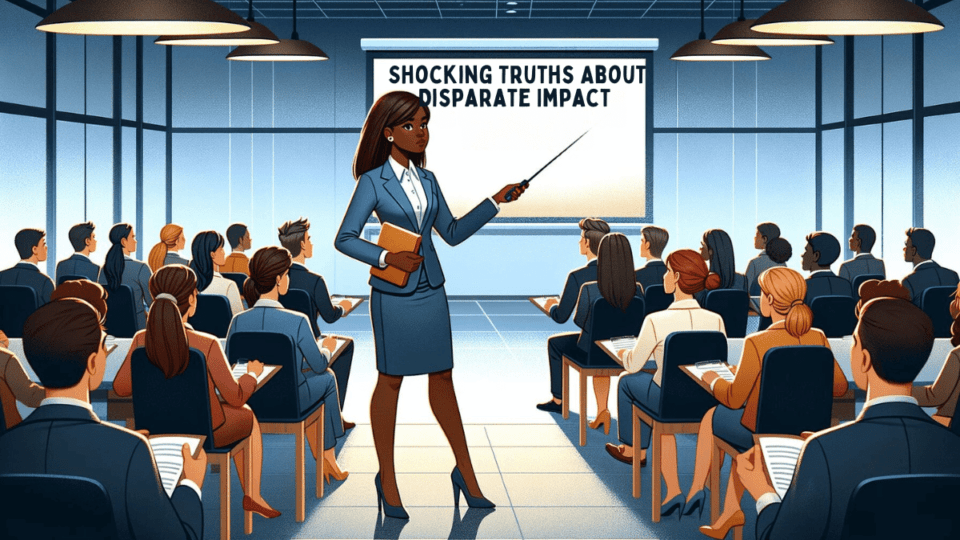Companies are always looking for new ways to make hiring faster and better. But there’s a big issue we can’t ignore: disparate impact. This might seem like a tough topic, but with the help of experts like Adebola Aderinto, a skilled lawyer with a rich background in labor and employment law, it becomes much simpler to understand. Adebola offers a unique view and deep insights, making it easier for us to tackle this important issue.
Understanding Disparate Impact
Disparate impact is when job rules seem fair but unfairly affect certain groups, like people of different races, genders, or ages, even if there’s no intended harm. In 2022, the EEOC received over 67,000 charges, with the most frequent bases being race, sex (including pregnancy), disability, and age.
Imagine a job that asks for a specific degree or a physical test. These requirements might look neutral but could favor some people over others without meaning to. This idea isn’t about blaming companies for doing this on purpose. It’s more about understanding that sometimes our actions can lead to results we didn’t expect. By knowing this, we can work together to ensure everyone has equal chances, showing how we can all help make things more fair and inclusive.
The Role of Background Checks
When companies hire, they often do a background check. It’s like their way of double-checking who they’re bringing on board. They want to ensure you have the right skills and history that fit the company’s vibe. But here’s the thing, if they’re not super careful about how they do these checks, they might accidentally be unfair. Imagine this: the way they check your past could, without meaning to, leave out more people from one ethnic group than another. That’s because sometimes, the rules about who gets flagged in these checks can be kind of skewed by bigger problems in the legal system.
Enter Adebola Aderinto. She’s a powerhouse in civil litigation and all about making things fair for everyone. Adebola believes it’s time for a change. She says companies need to think about the bigger picture of their background checks. By tweaking how they do things, companies can make hiring fairer. It’s all about giving everyone a fair shot at the job, which is not only cool but right.
Strategies to Mitigate Bias and Ensure Fair Hiring Practices
- Comprehensive Review of Hiring Criteria: Organizations should thoroughly examine their hiring criteria to identify any requirements that may inadvertently disadvantage protected groups. This involves questioning the necessity of certain qualifications and considering whether alternative criteria could serve the same purpose without the same adverse impact.
- Bias Training: Implementing training programs for HR personnel and hiring managers can raise awareness about unconscious biases and disparate impact. Adebola emphasizes the importance of such training, noting that understanding bias is the first step toward mitigating its effects.
- Diverse Recruitment Channels: Businesses should diversify their recruitment channels to attract a wide range of candidates. This includes engaging with minority-focused job boards, professional associations, and educational institutions to reach underrepresented groups.
- Standardized Assessment Processes: By standardizing interviews and evaluations, companies can reduce the subjective biases that might affect hiring decisions. Objective criteria and structured interviews ensure that all candidates are assessed fairly and consistently.
- Regular Audits of Hiring Practices: Regular audits can help organizations identify any patterns of adverse impact in their hiring processes. These audits should examine the demographics of applicants compared to those selected for interviews and, ultimately, those hired.
Meet Adebola Aderinto: A Champion for Diversity and Inclusion
Adebola’s story is truly inspiring. From her student days at Suffolk University Law School to her impressive career, she’s always made the legal world more welcoming for everyone. She’s picked up awards like the Distinguished Oral Advocate Award and even led as the Director of Diversity and Inclusion at her school’s Student Bar Association. This shows how committed she is to ensuring everyone gets a fair shake.
Adebola knows the ins and outs of employment law like the back of her hand, and she’s the go-to person for any organization wanting to be more inclusive. Her message is clear: when we’re trying to hire the best people, we need to make sure we’re doing it in a way that’s fair to everyone.
Key Takeaways
Let’s face it, hiring can be tricky, especially when we’re trying to avoid bias without even realizing it. That’s where Adebola Aderinto comes in. She’s here to guide us, ensuring our hiring practices are as fair and welcoming as possible. Her commitment to diversity and inclusion doesn’t just improve the legal field; it inspires us all to push for a truly inclusive workplace. Adebola’s passion for making a difference reminds us that we all have a part to play in building a more inclusive world.

If your colleague, friend, or family member is making an impact in their career, industry, or community, we want to hear about it.
